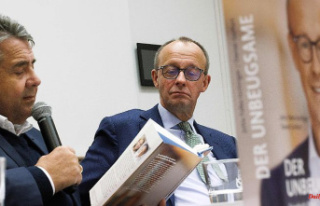Darkness, freezing cold, no water: The situation in large parts of Ukraine is dramatic and Kiev's Mayor Klitschko is expecting the worst. According to President Selenskyj, 2,000 places are still occupied by Russians - and many of the liberated areas have apparently been completely destroyed and plundered.
The mayor of Kyiv, Vitali Klitschko, is anticipating a dramatic winter for the Ukrainian capital, which has a population of around three million, because of the power cuts. "This is the worst winter since the Second World War," he told the "Bild" newspaper. You have to be prepared for the "worst scenario" of widespread power failures at low temperatures: "Then parts of the city would have to be evacuated," he said. "But we don't want to let it get that far!" As a result of the Russian attacks on the electricity grid, Ukraine has had to contend with power cuts, but also with problems with heating, water and gas supplies.
The ex-boxing world champion accused Russian head of state Vladimir Putin of wanting to drive Ukrainians to flee Kyiv by attacking civilian infrastructure. "Putin wants to terrorize people, let them freeze without light." Pressure should be put on the Ukrainian President Volodymyr Zelenskyj. "But that won't happen. My impression is that people will only get angrier, more determined. We won't die or flee like Putin wants us to," said Klitschko. He asked Germany to urgently send generators, protective clothing and humanitarian goods in addition to weapons for defense.
Because of the destruction of the energy infrastructure, President Volodymyr Zelenskyy announced the establishment of more than 4,000 warming rooms for the population of the attacked country plagued by cold and darkness. "All the basic services are provided there," he said in his evening video address. "This includes electricity, mobile communication and the Internet, heat, water, first aid. Completely free of charge and around the clock."
Selenskyj called the facilities in administration buildings or schools "stability points". The official name on a government website also translates to "points of steadfastness." "I am sure that if we help each other, we will get through this winter together," he said. "Should there be another massive Russian attack and the power supply cannot be restored within a few hours, the work of the 'stability points' will be activated," Zelensky said. Local authorities should provide information "where to find support in the event of a prolonged power outage." Companies are also asked to provide rooms or help.
According to Zelenskyj, around 2,000 towns and villages occupied by Russian troops in Ukraine still have to be liberated. As he said in a video message for French local politicians, a few dozen places such as the port city of Mariupol on the Azov Sea or Volnovakha in the Donetsk region have been completely destroyed by Russian attacks. Ukraine is trying to quickly bring life back to normal in recaptured towns, Zelensky said.
His country is therefore grateful for all the help in defense and reconstruction. Where the Russian army withdraws, it plunders the occupied towns and villages again and destroys the infrastructure. According to the deputy head of the Presidential Office, Kyrylo Tymoshenko, the Ukrainian army has liberated around 1,880 towns in the almost nine months of war.












